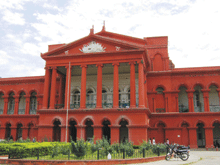 On July 2 in a well-argued judgement in KAMS Case (2008), a three-judge bench comprising Chief Justice Cyriac Joseph, Justice Manjula Chellur and Justice N. Kumar of the Karnataka high court held that a state government order issued in 1994 mandating Kannada or the mother tongue as the compulsory medium of instruction in all primary schools (classes I-V) statewide is violative of the fundamental rights of the promoter/owners of Karnataka’s unaided or independent primary schools. Excerpts (verbatim) from the 318-page unanimous judgement delivered by Justice Kumar:
On July 2 in a well-argued judgement in KAMS Case (2008), a three-judge bench comprising Chief Justice Cyriac Joseph, Justice Manjula Chellur and Justice N. Kumar of the Karnataka high court held that a state government order issued in 1994 mandating Kannada or the mother tongue as the compulsory medium of instruction in all primary schools (classes I-V) statewide is violative of the fundamental rights of the promoter/owners of Karnataka’s unaided or independent primary schools. Excerpts (verbatim) from the 318-page unanimous judgement delivered by Justice Kumar:
On the right of all citizens to establish and administer educational institutions of their choice
Article 19(1)(g) confers on all the citizens of this country a fundamental right to practice any profession or to carry on any occupation, trade or business. Occupation would be an activity of a person undertaken as a means of livelihood or a mission in life. The establishment and running of an educational institution and an activity carried thereunder which results in imparting of knowledge to students must necessarily be regarded as an occupation, even if there no element of profit generation... It is implicit in the said right to establish and administer an educational institution, the right of a citizen to choose the medium of instruction in which knowledge is to be imparted. (para 105)
On the right of school promoters to choose the medium of instruction
Right to choose the medium of instruction is a fundamental right. It is for the persons who are establishing the institution to decide the medium of instruction and the course of study… If they want recognition from the State, it is open to the State to prescribe by way of regulation all that is necessary to achieve excellence in education by way of curriculum, syllabus, qualification of teachers, the nature of examinations and host of other matters which are conducive to make the institution an effective vehicle of education. But if the recognition is dependent on the medium of instruction prescribed by the State and if that is not acceded to and if without surrendering that fundamental right the institution cannot be established, then it ceases to be a regulation. It would be an unreasonable restriction and a total denial of the fundamental right… (para 166)
On the right of parents/child to chose medium of instruction
It is fairly well settled and universally recognised that it is a parental right to have primary education of their children in the school and language of their choice. The parental right in education is the very pivotal point of a democratic system. It is the touch-stone of difference between democratic education and monolithic system of cultural totalitarianism. The fundamental postulate of personal liberty excludes any power of the State to standardise and socialise its children… A child is not a mere creature of the State. The parents have the right to decide as to whether their children should secure primary education in the mother tongue or not. No one can question the constitutional right of parents to discharge their fundamental duty to educate their children by sending them to schools and colleges so long as these schools and colleges meet the standards established for secular education... The State cannot step in and arrogate to itself the power to decide as to the language in which the children should have their primary education. Therefore it is a fundamental right of the parent and child to choose the medium of instruction even in primary school. The police power of the State to determine the medium of instruction must yield to the fundamental right of the parents and the child. (para 135)
On English as medium of instruction
English is the key to the treasures of modern knowledge. It is an open window for peeping into western thought and science. It is an international language. It is an associate language as recognised by our Constitution. Without English, in many parts of India, inter-state communication is difficult. In a multilingual country, English has come in handy as a link language. The desire of parents to impart education to their children in a well known international language like English cannot be bypassed, forgetting the hard realities of life… (para 195)
On State compulsion
Only in totalitarian regimes like Russia, China, Korea and Vietnam and previously a monarchy like Japan, they were able to implement the mother tongue as medium of instruction by brute force of the State. An additional factor which enabled them to do so was firstly they are unilingual States. Secondly, those countries were not under the control of Britishers for centuries and there was no influence of English language over their population. But in democracies, where personal liberties are guaranteed to citizens (and) the State has provided facilities for learning subjects in primary school in the medium of mother tongue, nowhere is compulsion imposed to have primary education in mother tongue only. The choice is given to the child and its parents and in this regard the rights of the parent and the child are fully recognised, respected, protected and not trampled upon. (para 189)